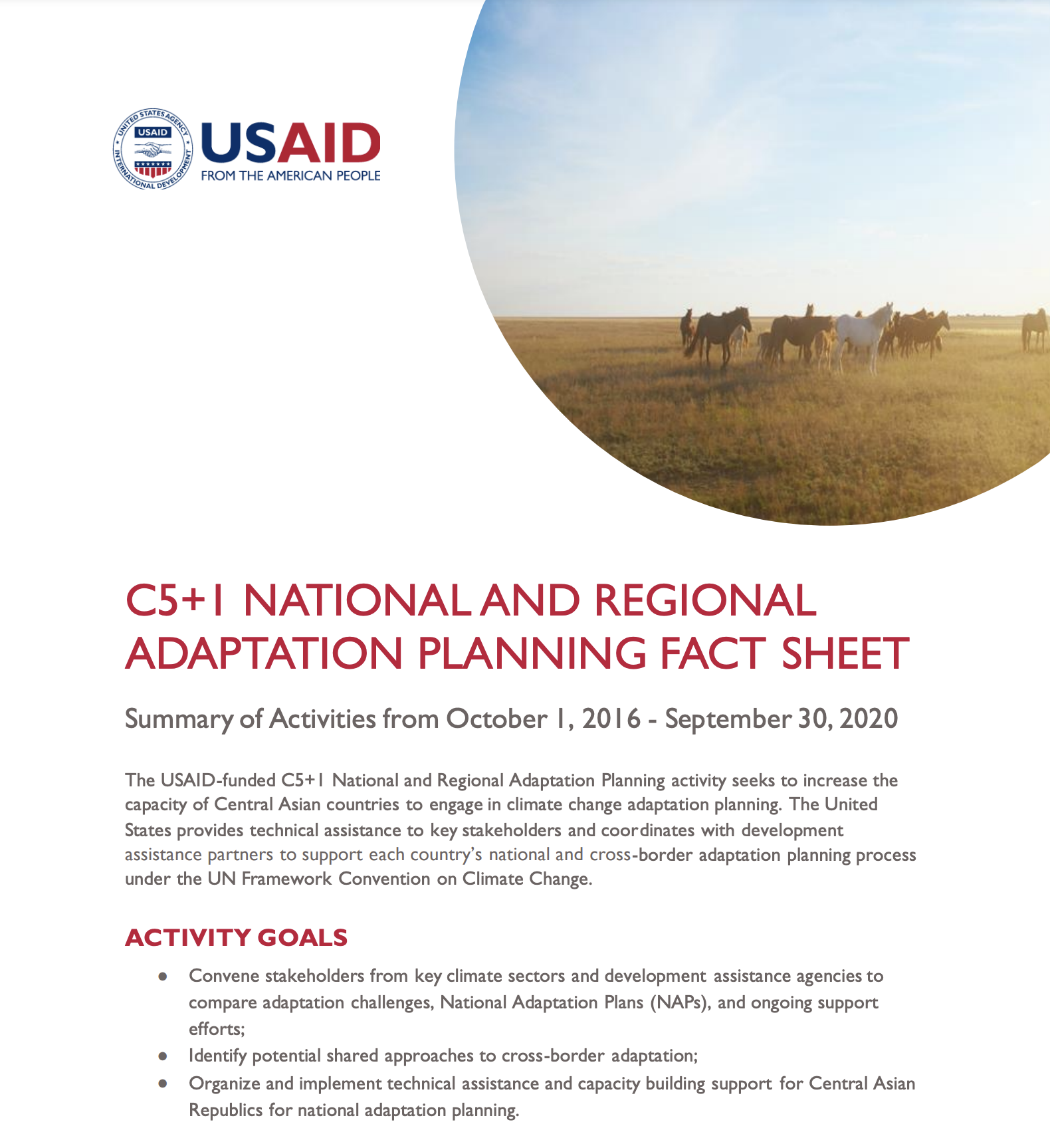Speeches Shim
Summary of Activities from October 1, 2016 - September 30, 2020
The USAID-funded C5+1 National and Regional Adaptation Planning activity seeks to increase the capacity of Central Asian countries to engage in climate change adaptation planning. The United States provides technical assistance to key stakeholders and coordinates with development assistance partners to support each country’s national and cross-border adaptation planning process under the UN Framework Convention on Climate Change.
Activity goals
- Convene stakeholders from key climate sectors and development assistance agencies to compare adaptation challenges, National Adaptation Plans (NAPs), and ongoing support efforts;
- Identify potential shared approaches to cross-border adaptation;
- Organize and implement technical assistance and capacity building support for Central Asian Republics for national adaptation planning.
Activity accomplishments
- C5+1 Adaptation Working Group and the Central Asia Regional Environment Center (CAREC) co-organized a technical workshop, “Determination of regional needs on climate knowledge and information on climate change adaptation and mitigation in the context of the Post-Paris process in Central Asia,” in Almaty, Kazakhstan (2017). USAID led sessions on adaptation, presented on NAP planning, finance and implementation, and facilitated the Working Group process to enable delegations from the C5 to articulate their priorities for potential adaptation planning support. One of the key outcomes of these discussions was a request to provide country-level support in addition to regional support envisioned for the other C5+1 projects.
- USAID convened a three-day regional workshop on NAP Financing in Issyk-kul, the Kyrgyz Republic in 2017. USAID trainers facilitated discussions centered on the importance of assessing capabilities to finance projects early; methods for developing financing strategies; and financing options for adaptation investments in the public and private sectors. These themes, along with the importance of mainstreaming environmental vulnerabilities into development and sector planning and policies, have been the foundation for USAID adaptation assistance in the C5.
- The Republic of Kazakhstan requested assistance in incorporating climate change adaptation into its Environmental Code. With USAID support, climate change adaptation was included into the draft Environmental Code of the Republic of Kazakhstan (as of September 2020 under review by the Parliament of the Republic of Kazakhstan) and related regulations, and training was held to build capacity of government staff and experts to implement the new requirements related to climate change adaptation.
- A chapter on climate change adaptation was drafted, vetted, and included into the new draft Environmental Code of the Republic of Kazakhstan;
- Regulations implementing adaptation-related provisions of the draft Environmental Code were drafted, vetted, and revised;
- Methodological Guidance – a technical document that explains how to implement the adaptation process described in the draft Environmental Code – was drafted, vetted, and revised;
- A workshop was held in Nur-Sultan on climate change adaptation generally, potential adaptation provisions to include in the Environmental Code, and NAP financing and implementation (2017);
- Training-of-Trainers workshops were held to build capacity of 50 governmental staff and experts in Kazakhstan with regard to climate change adaptation generally, and with an emphasis on how to conduct vulnerability assessments and adaptation planning (2018, 2019);
- In 2020, an online training course was held to build capacity of governmental staff and experts in Kazakhstan, focusing on the impacts of climate change in the Republic of Kazakhstan, adaptation generally, adaptation requirements described in the new Environmental Code and related Regulations, steps of the adaptation process described in the Methodological Guidance, funding sources for adaptation projects, and adaptation at the regional level; 166 participants attended the online training course in 2020, and at the conclusion of the course, 93 participants successfully passed the final test and received certificates of successful completion of the course.


Comment
Make a general inquiry or suggest an improvement.